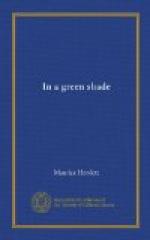The “unturn’d cheeke of our old mother!” The New World should be pleased with that.
In 1615 he made a much further flight, and was to
be heard of at “the Court of the most Mighty
Monarch, the Great Mogul,” whence he wrote to,
among other people, the High Seneschal of the “Right
Worshipful Fraternity of Sireniacal Gentlemen that
meet the first Friday of every month at the Signe
of the Mere-maide in Bread-Streete.” In
this particular letter he greets by name Mr. John
Donne, “the author of two most elegant Latine
Bookes,” Master Benjamin Jonson, the poet, at
his chamber in the Blacke Friars, Mr. Samuel Purkas,
and Mr. Inigo Jones, and signs himself “the
Hierosolymitan—Syrian—Mesopotamian
—Armenian—Median—Parthian&m
dash;Persian—Indian—Leggestretcher
of Odcomb in Somerset.” The news he gives
of “the most famigerated Region of all the East,
the ample and large India,” is various and occasionally
incredible, but none the worse perhaps for that.
You must allow the leg-stretcher to be something also
of a leg-puller. The Great Mogul had elephant-fights
twice a week, we learn. He might well do so if
we could believe that he maintained three thousand
of them “at an unmeasurable charge.”
Proceeding, nevertheless, to measure it, Coryat finds
it works out at L10,000 a day, which is pretty good
even for the Mogul. He also had a thousand wives,
“whereof the chiefest (which is his Queene)
is called Normal.” I like her name.
Coryat rode on an elephant, “determining one
day (by God’s leave) to have my picture expressed
in my next book, sitting upon an elephant.”
But the voyage to the East was one too many for “the
ingenious perambulator,” and he died of a flux
at Surat in December, 1617. Certain English merchants
offered him refreshments. “Sack, sack, is
there any such thing as sack? I pray you give
me some sack.” They did; the dysentery
was upon him at the time. Even as Sir John might
have done did he, and was buried “under a little
monument.” Sic exit Coryatus, says his
biographer.
No sooner was he dead than his fellow Sireniacks fell upon his reputation and tore it to shreds.
He was the imp, whilst he on earth surviv’d,
From whom this West-World’s pastimes
were deriv’d;
He was in city, country, field and court
The well of dry-trimm’d jests, the
pump of sport.
So writes the Water Poet. Another wag trounces his Crudities:
Tom Coriat, I have seen thy Crudities,
And methinks very strangely brewed it
is,
With piece and patch together glued it
is;
And now (like thee) ill-favour’d
hued it is.
In many a line I see that lewd it is,
And therefore fit to be subdued it is—
and much more to the same effect.
Coryat’s “natalitial place,” as it happens, is very near to mine, and I find something to love in a man who can never forget it. He was a cockscomb, he was an ass; but he preferred the West of England to Italy. He called James I., our king, the “refulgent carbuncle of Christendom,” and Prince Charles “the most glittering chrysolite of our English diademe” Both are hard sayings.




